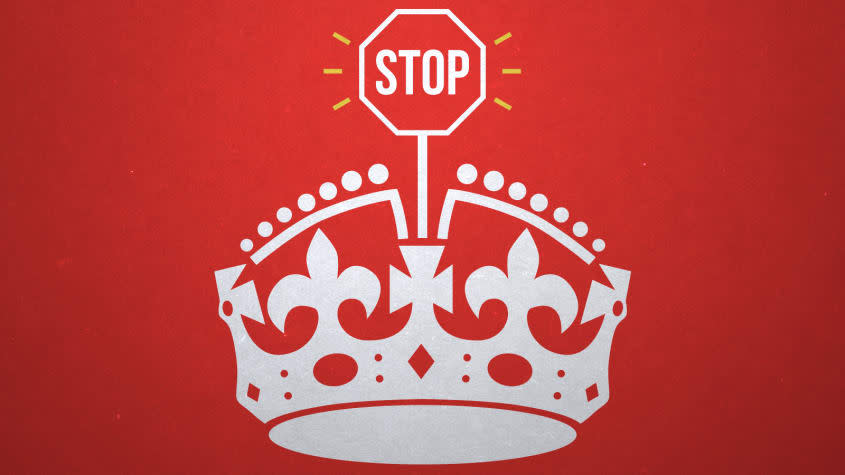Should the British monarchy continue?

The death of the United Kingdom's long-ruling Queen Elizabeth II and the ascension of her son King Charles III has renewed a debate around the purpose of the monarchy in today's day and age. In a modern world that heralds democratic institutions (or at least tries to), should a royal family — let alone one with an imperialist and colonialist past — even exist?
Below, columnists lay out a number of arguments against the continuation of the crown, and explain how they might stand to square the issue (for which protesters are already mobilizing, albeit in small numbers) with Elizabeth's historic reign:
Abolish the monarchy because the family deserves it
The coverage of Elizabeth's death has been "somber and reverential" — and "we can expect that hushed, respectful mood to persist," Andrew Mitrovica opined for Al Jazeera. But even during a period of national mourning, "it would be deeply irresponsible and an egregious mistake to avoid acknowledging that the imperial institution Queen Elizabeth II led has caused indelible harm and suffering to so many people, in so many places."
As Commonwealth states consider removing themselves from the shadow of the U.K. monarchy (as Barbados did last December), their decision should be made easier "in part because the Windsor family has not only devolved into farce, petty recriminations, and irreparable rifts, but has also been accused of committing vile sexual offences, including rape, against vulnerable children," Mitrovica argued, referencing most overtly the Jeffrey Epstein-adjacent scandal involving the disgraced Prince Andrew.
Relatedly, when Prince Harry and his wife, actress Meghan Markle, conceded in an infamous interview with Oprah Winfrey that "racism remains as present today as it was yesterday within the 'modern' royal family," Mitrovica summarized, "it was a refreshing sliver of honesty and a reminder that the monarchy deserves a burial — not the relentless hagiography that television viewers will be served in the coming days and weeks."
Abolish the monarchy to make reparations
The crown has recently begun coming to terms with its damaging past; in June, for example, speaking before Commonwealth leaders in Rwanda, then-Prince Charles publicly recognized the monarchy's deep ties to slavery. "I want to acknowledge that the roots of our contemporary association run deep into the most painful period of our history," he told leaders of the 50-some countries with roots in the British Empire, per Reuters. "I cannot describe the depths of my personal sorrow at the suffering of so many as I continue to deepen my own understanding of slavery's enduring impact."
Still, such remarks are perhaps just a mere fraction of a step toward the reparations formerly colonized countries might now desire, Nalini Mohabir argued in The Guardian. And appropriate reparations would be "not just an apology, but distributive justice between so-called developed and developing countries. Integral to reparations is the idea of repairing unequal, one-sided relationships."
Moving forward, "what might duty look like if we understood that debts need to be paid and apologists held accountable? What might public service mean if we understood that imperial attitudes and monarchic institutions must be abolished for an alternative future to be born?" Mohabir continued. For that, it's "time to imagine a future without" the crown.
Abolish the monarchy to honor Elizabeth
Queen Elizabeth charmed her kingdom — even as scandal tore through the royal ranks, her appeal (and the general spectacle of the monarchy) fed an enraptured public, wrote Kimberly Atkins Stohr in a column for The Boston Globe. Now, with such adoration in mind, "there could be no better tribute" to the late ruler than "making her reign one of Britain's last."
She is the "only reason that the royal family has been able to sustain, let alone have any level of popularity" in Britain, and she single-handedly "kept the monarchy alive largely by the sheer force of personality," Stohr maintained. "Neither King Charles III nor his progeny, who are far less popular and far more scandal-ridden, will ever be able to pull that off. Nor should they try." Rather, they should focus on winding the monarchy down and "[ushering] England into the modern era."
Yes, the royals must first mourn, and should be allowed to do so. "But then King Charles III and his family should make a change," she continued. "The charming spell, at long last, has been broken."
Don't hate the player, hate the game
That there are those who would like to do away with the monarchy, or those that despised the queen, should come as no surprise; Elizabeth "was the symbolic representation of Britain," and it makes sense that "those who have suffered from British imperialism hate her and all that she stood for," Frances Coppola posited for MarketWatch. But what her detractors should remember is that Elizabeth was just one part of a larger, more nefarious system — a system she herself was unable to exit.
"That jeweled crown was borne by a woman who spent her life in a gilded cage, unable to escape without hurting those she loved," Coppola wrote. "And in death, the crown moves on to its next victim, and all that is left is a human being." Yes, all are entitled to "hate the crown and what it stands for." All have the right to call for abolition and encourage reparations. But let those who loved the woman at the heart of an institution she did not create "mourn for her in peace."
You may also like
Jimmy Kimmel faces backlash over 'disrespectful' Emmys bit during Quinta Brunson's speech
Russian forces appear to be in disarray as Ukraine expands, consolidates lighting gains in Kharkiv

 Yahoo News
Yahoo News 
